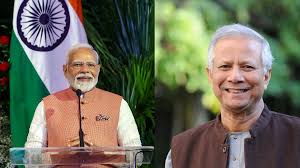PM Modi writes to Muhammad Yunus, letter stirs diplomatic conversations
As Bangladesh navigates a period of political uncertainty, a strategically timed letter from Indian Prime Minister Narendra Modi to Chief Adviser Muhammad Yunus has sparked diplomatic discussions. The message, sent in commemoration of Bangladesh’s Independence Day, has drawn attention for its timing and content.
Extending his felicitations to the people of Bangladesh, Modi highlighted the shared history between the two nations. In a statement released by the Indian High Commission in Bangladesh, he remarked:
“I extend my felicitations to you and the people of Bangladesh on the occasion of the National Day of Bangladesh. This day stands as a testament to our shared history and sacrifices, that have laid the foundation of our bilateral partnership.”
Recognizing the deep-rooted ties between India and Bangladesh, he further stated:
“The spirit of the Liberation War of Bangladesh continues to remain a guiding light for our relationship, which has flourished across multiple domains, bringing tangible benefits to our peoples. We remain committed to advancing this partnership, driven by our common aspirations for peace, stability, and prosperity, and based on mutual sensitivity to each other’s interests and concerns.”
The reference to the 1971 Liberation War is a significant reminder of Bangladesh’s struggle for independence, an event in which India played a crucial role. Modi’s emphasis on stability and cooperation suggests India’s ongoing interest in maintaining strong ties with its eastern neighbor amid political turbulence.
Meanwhile, the interim government led by Muhammad Yunus is facing increasing public skepticism. There are growing discussions regarding the possible return of former Prime Minister Sheikh Hasina to power. Dr. Rabbi Alam, Vice President of the United States Awami League and a staunch Hasina supporter, strongly criticized the interim government in an interview with ANI on March 13. Calling the current administration “illegitimate,” Alam alleged that the younger generation had been misled into supporting Hasina’s removal. He insisted that Yunus should step down and resume his previous role, asserting that Hasina’s return to leadership was “inevitable.”
India has maintained a careful diplomatic stance throughout the ongoing political developments. Alongside Modi’s message, Indian President Droupadi Murmu also conveyed her greetings to Bangladesh’s President Mohammed Shahabuddin, reaffirming the historically strong ties between the two nations. While Modi’s letter does not explicitly endorse any political group, his reference to shared history and stability underscores New Delhi’s interest in a steady and cooperative Bangladesh.
Amid this evolving political landscape, reports indicate that Bangladesh could be on the brink of a major shift, with speculation growing over the possibility of military intervention. Sources from India Today revealed that the Bangladeshi military, led by Chief of Army Staff General Waker-Uz-Zaman, convened an emergency meeting earlier this week. The gathering, attended by top military officials—including five Lieutenant Generals and eight Major Generals—focused on the potential role of the armed forces in stabilizing a nation increasingly disillusioned with the interim government.
At the heart of the controversy is Nobel laureate Muhammad Yunus, who has come under mounting criticism for his leadership of the caretaker government. As tensions escalate and opposition voices grow louder, his hold on power appears increasingly precarious. Whether Bangladesh is heading towards a political transition or deeper uncertainty remains to be seen.

